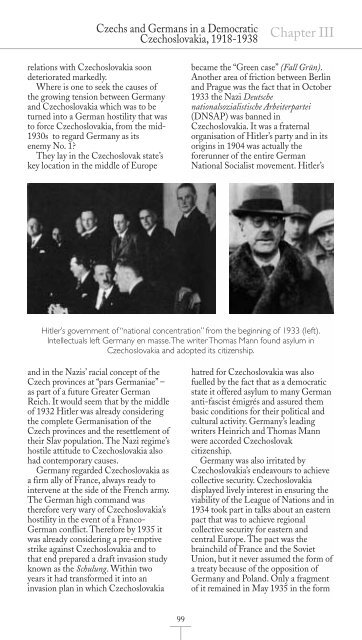the nationality of all inhabitants of the czech provinces and ...
the nationality of all inhabitants of the czech provinces and ...
the nationality of all inhabitants of the czech provinces and ...
Create successful ePaper yourself
Turn your PDF publications into a flip-book with our unique Google optimized e-Paper software.
Czechs <strong>and</strong> Germans in a Democratic<br />
Czechoslovakia, 1918-1938<br />
relations with Czechoslovakia soon<br />
deteriorated markedly.<br />
Where is one to seek <strong>the</strong> causes <strong>of</strong><br />
<strong>the</strong> growing tension between Germany<br />
<strong>and</strong> Czechoslovakia which was to be<br />
turned into a German hostility that was<br />
to force Czechoslovakia, from <strong>the</strong> mid-<br />
1930s to regard Germany as its<br />
enemy No. 1?<br />
They lay in <strong>the</strong> Czechoslovak state’s<br />
key location in <strong>the</strong> middle <strong>of</strong> Europe<br />
<strong>and</strong> in <strong>the</strong> Nazis’ racial concept <strong>of</strong> <strong>the</strong><br />
Czech <strong>provinces</strong> at “pars Germaniae” –<br />
as part <strong>of</strong> a future Greater German<br />
Reich. It would seem that by <strong>the</strong> middle<br />
<strong>of</strong> 1932 Hitler was already considering<br />
<strong>the</strong> complete Germanisation <strong>of</strong> <strong>the</strong><br />
Czech <strong>provinces</strong> <strong>and</strong> <strong>the</strong> resettlement <strong>of</strong><br />
<strong>the</strong>ir Slav population. The Nazi regime’s<br />
hostile attitude to Czechoslovakia also<br />
had contemporary causes.<br />
Germany regarded Czechoslovakia as<br />
a firm <strong>all</strong>y <strong>of</strong> France, always ready to<br />
intervene at <strong>the</strong> side <strong>of</strong> <strong>the</strong> French army.<br />
The German high comm<strong>and</strong> was<br />
<strong>the</strong>refore very wary <strong>of</strong> Czechoslovakia’s<br />
hostility in <strong>the</strong> event <strong>of</strong> a Franco-<br />
German conflict. Therefore by 1935 it<br />
was already considering a pre-emptive<br />
strike against Czechoslovakia <strong>and</strong> to<br />
that end prepared a draft invasion study<br />
known as <strong>the</strong> Schulung. Within two<br />
years it had transformed it into an<br />
invasion plan in which Czechoslovakia<br />
99<br />
Chapter III<br />
became <strong>the</strong> “Green case” (F<strong>all</strong> Grün).<br />
Ano<strong>the</strong>r area <strong>of</strong> friction between Berlin<br />
<strong>and</strong> Prague was <strong>the</strong> fact that in October<br />
1933 <strong>the</strong> Nazi Deutsche<br />
nationalsozialistische Arbeiterpartei<br />
(DNSAP) was banned in<br />
Czechoslovakia. It was a fraternal<br />
organisation <strong>of</strong> Hitler’s party <strong>and</strong> in its<br />
origins in 1904 was actu<strong>all</strong>y <strong>the</strong><br />
forerunner <strong>of</strong> <strong>the</strong> entire German<br />
National Socialist movement. Hitler’s<br />
Hitler’s government <strong>of</strong> “national concentration” from <strong>the</strong> beginning <strong>of</strong> 1933 (left).<br />
Intellectuals left Germany en masse.The writer Thomas Mann found asylum in<br />
Czechoslovakia <strong>and</strong> adopted its citizenship.<br />
hatred for Czechoslovakia was also<br />
fuelled by <strong>the</strong> fact that as a democratic<br />
state it <strong>of</strong>fered asylum to many German<br />
anti-fascist émigrés <strong>and</strong> assured <strong>the</strong>m<br />
basic conditions for <strong>the</strong>ir political <strong>and</strong><br />
cultural activity. Germany’s leading<br />
writers Heinrich <strong>and</strong> Thomas Mann<br />
were accorded Czechoslovak<br />
citizenship.<br />
Germany was also irritated by<br />
Czechoslovakia’s endeavours to achieve<br />
collective security. Czechoslovakia<br />
displayed lively interest in ensuring <strong>the</strong><br />
viability <strong>of</strong> <strong>the</strong> League <strong>of</strong> Nations <strong>and</strong> in<br />
1934 took part in talks about an eastern<br />
pact that was to achieve regional<br />
collective security for eastern <strong>and</strong><br />
central Europe. The pact was <strong>the</strong><br />
brainchild <strong>of</strong> France <strong>and</strong> <strong>the</strong> Soviet<br />
Union, but it never assumed <strong>the</strong> form <strong>of</strong><br />
a treaty because <strong>of</strong> <strong>the</strong> opposition <strong>of</strong><br />
Germany <strong>and</strong> Pol<strong>and</strong>. Only a fragment<br />
<strong>of</strong> it remained in May 1935 in <strong>the</strong> form


